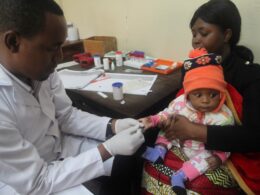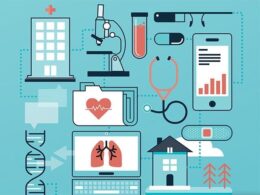Macron has made prevention a main pillar of his health plans — so much so that, in the new government, the health minister, Brigitte Bourguignon, is now called the Minister of Health and Prevention.
This is a republication of the article below, with the title above.
Waiting for France’s turn towards preventive health care
The Lancet
Ferry Biedermann
June 11, 2022
labormesp
Executive Summary
by Joaquim Cardoso MSc.
The Health Revolution Institute
For Better Health and Better Care for All, at Lower Cost
June 15, 2022
What is the problem?
- “The problem is that the hospitals, similarly to many other countries because of the [COVID-19] crisis, were put under tremendous strain.
- A structural problem is that France already spends a lot on health care. As a percentage of GDP, France is third in Europe: we spend some 12%.”
Apart from the high-profile staffing problems, health has been in the spotlight for different reasons:
- the debate around health care during the COVID-19 crisis was often strident;
- there is widespread unease over medical deserts, which has fed into the discourse of marginalisation by the gilets-jaunes protesters;
- the care home system for older people is in crisis;
- and there are concerns over the sustainability of the financing of the health system.
What are the promises?
- Health has been designated a priority, one of three emergencies that the new government of freshly appointed Prime Minister Élisabeth Borne has promised to tackle, alongside climate change and the rising cost of living.
- We have to do those at the same time: solve the present problems and prepare for the future”,
What are the Proposals?
The proposals include:
- free health checks at set ages: 25, 45, and 60 years.
- Among other prevention measures are more sports in school, attention to childhood health education and disease prevention, and workplace health promotion.
What are some of the challenges?
- We cannot leave these important things to ministries that don’t have health as their main objectives
- The focus remains on providing care rather than on prevention: “We have a system that’s completely centred on the hospital and the curative approach.”
Will this reform work?
Bergeron has his doubts about the prevention strategy set out in Macron’s programme.
- Will we still have a paternalistic state-centred approach to prevention, or will there really be money to recruit and train professionals in public health to develop community-based approaches?”
- The new prevention measures alone will not achieve the ultimate goal of reducing and postponing the need for care and helping people to live a healthier life for longer,
- “These health checks are one step. Of course they will not solve all the problems, but it’s a step.
What else is needed?
- Even more effective, and the English have shown this, is addressing the wider determinants: education, housing, transport, and social policy.
- We’ll have to tackle those, but at the same time these check-ups are a good signal for the population that there’s not only health care, there’s also prevention.”
- Prevention and reducing and postponing the need for care should eventually alleviate staffing problems and the problem of medical deserts.
- In the meantime, proposals to keep interning doctors on for an extra year in hospitals to boost staffing and a drive to allow nurses and pharmacists more leeway in taking over some tasks from physicians should help to address the problem.
Deeply entrenched attitudes, both in medicine and politics, are still liable to make quick solutions unlikely
- “There is a lot of talk about the massive recruitment of nurses and doctors. But all the decision makers know that it will take at least 10 years to reverse the current trend.
- It will also be necessary to significantly improve working conditions and remuneration to attract new carers.”
- The idea that telemedicine and other remote and digital practices will solve the issue is, he says, “magical thinking”.
What is needed from the administrative and financial perspective?
- There is widespread agreement on the necessity to ease the administrative burden, which also afflicts other sectors of French public life, government bodies, institutes, and national and regional actors.
- Finding the money to implement the needed reforms will also be a challenge. Bizard noted that resources are not the issue: “We have more resources in the system than ever.” The problem is allocating them correctly.
Yet, change it must, said Chauvin. “I really think that the next 5 years will be crucial.
- Either we succeed in taking this preventive turn or we shall have to fundamentally change our health system and our social system.”
- That would involve opting for a structure more akin to that in the USA, “which is not what the French want”.
ORIGINAL PUBLICATION (full version)
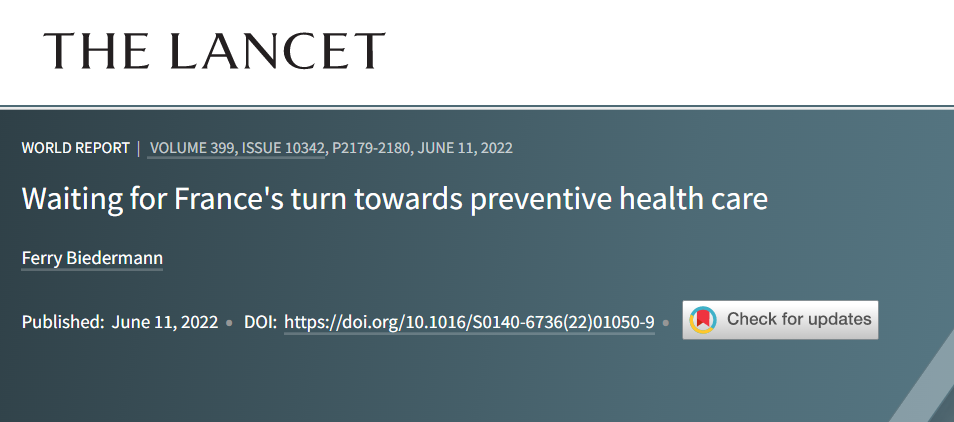
Waiting for France’s turn towards preventive health care
The Lancet
Ferry Biedermann
June 11, 2022
Health has been designated a priority by the French government, with an emphasis on disease prevention. Ferry Biedermann reports.
At the end of May, 2022, the geriatric hospital La Collégiale in the 5th arrondissement of Paris was forced to close temporarily due to a lack of nursing staff.
The same day, the head of the Paris hospital system told French media that he lacked some 1400 nurses, a shortfall repeated across the country.
n the post-pandemic era, such staffing problems are occurring all over the world, but to the French it is particularly galling that this situation happened in the heart of the capital, in the same neighbourhood as the world famous Quartier Latin.
Additionally, staffing problems are not new in France.
The closure comes between two key elections: President Emmanuel Macron’s successful re-election bid in April, and the parliamentary elections on June 12 and 19.
Macron’s centrist movement, rechristened Renaissance, hopes once more to secure a majority.
If so, he should be well placed to carry out his programme for the next 5 years, barring new pandemics or massive gilets-jaunes street demonstrations that might reshuffle policies.
Health has been designated a priority, one of three emergencies that the new government of freshly appointed Prime Minister Élisabeth Borne has promised to tackle, alongside climate change and the rising cost of living.
Health has been designated a priority, one of three emergencies that the new government of freshly appointed Prime Minister Élisabeth Borne has promised to tackle, alongside climate change and the rising cost of living.
Franck Chauvin, president of the Haut Conseil de la Santé Publique, the main governmental advisory body on health, would like to focus on reforming and future-proofing the health system.
The previous health minister commissioned a report from him to that end, and its fingerprints can be found all over Macron’s programme for the next 5 years.
Chauvin acknowledges that the government is fighting a battle on several fronts.
“The problem is that the hospitals, similarly to many other countries because of the [COVID-19] crisis, were put under tremendous strain.
There are not enough doctors and nurses; we have to solve that now. For the future, it’s prevention and health education and living longer in good health.
We have to do those at the same time: solve the present problems and prepare for the future”, said Chauvin, himself an oncologist.
He said that the system urgently needs to take a preventive turn. For that to happen, “there will have to be a very hard political push to change things”.
“The problem is that the hospitals, similarly to many other countries because of the [COVID-19] crisis, were put under tremendous strain.
We have to do those at the same time: solve the present problems and prepare for the future”, said Chauvin, himself an oncologist.
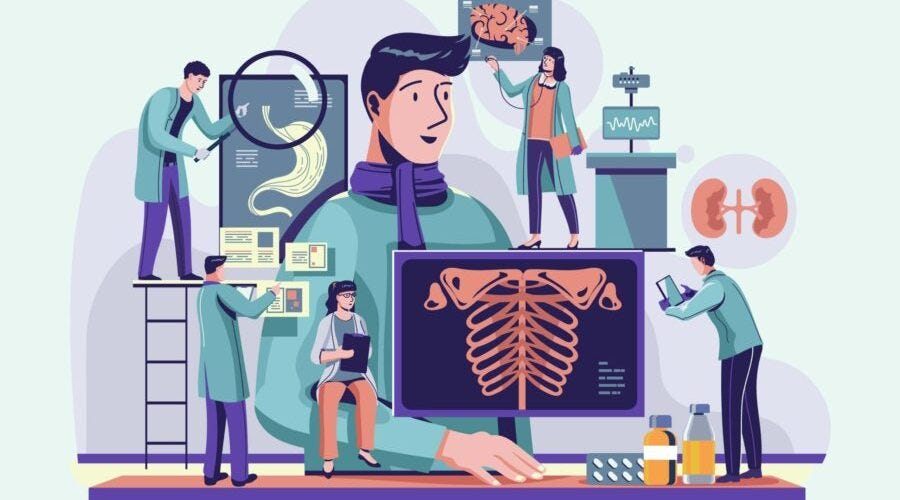
Apart from the high-profile staffing problems, health has been in the spotlight for different reasons:
- the debate around health care during the COVID-19 crisis was often strident;
- there is widespread unease over medical deserts, which has fed into the discourse of marginalisation by the gilets-jaunes protesters;
- the care home system for older people is in crisis;
- and there are concerns over the sustainability of the financing of the health system.
All these factors have led to more political attention for health, said Henri Bergeron, a sociologist specialising in public health at the French National Centre for Scientific Research (CNRS) and research university Sciences Po.
“During the campaign, the place of health-care policies was a lot more important compared to earlier elections”, he notes.
The political programmes, including those on the extreme right and far left, had to include a health plank, he said.
However, that does not mean that the issue played a major role in deciding the outcome of the campaigns.
“Even though the French regard health as a key value, it’s not been central to the political debate as it has been, for example, in the US”, says Bergeron.
One of his colleagues at the CNRS, Frédéric Pierru, points to one possible reason for this: “Not only do the candidates have a poor grasp of these issues, but they also fear being ‘sanctioned’ by the many interest groups in this policy area.”
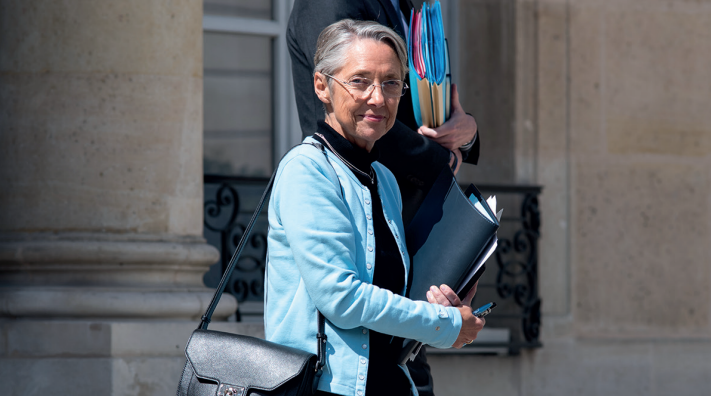
New French prime minister Élisabeth Borne
Nevertheless, Macron has made prevention a main pillar of his health plans — so much so that, in the new government, the health minister, Brigitte Bourguignon, is now called the Minister of Health and Prevention.
Proposals include free health checks at set ages: 25, 45, and 60 years.
Among other prevention measures are more sports in school, attention to childhood health education and disease prevention, and workplace health promotion.
Proposals include free health checks at set ages: 25, 45, and 60 years.
Among other prevention measures are more sports in school, attention to childhood health education and disease prevention, and workplace health promotion.
These initiatives exist in a vacuum, said Frédéric Bizard, who heads the Institut Santé, which lobbies for overhauling the health system.
“I would take it more seriously if they said, ‘it’s so important that we have to rethink the governance of this’.
We cannot leave these important things to ministries that don’t have health as their main objectives; that goes for the Ministry of Labour and the Ministry of Education”, said Bizard, who is a professor of economics at the ESCP Business School.
We cannot leave these important things to ministries that don’t have health as their main objectives; …
He said that the focus remains on providing care rather than on prevention: “We have a system that’s completely centred on the hospital and the curative approach.”
He said that the focus remains on providing care rather than on prevention: “We have a system that’s completely centred on the hospital and the curative approach.”
Bergeron too, has his doubts about the prevention strategy set out in Macron’s programme.
He noted that France has national prevention campaigns, but that these often increase health inequalities, rather than reduce them, as better educated groups are more easily reached and convinced.
He said that a different approach is needed: “I’m waiting to see what will happen to that.
Will we still have a paternalistic state-centred approach to prevention, or will there really be money to recruit and train professionals in public health to develop community-based approaches?”
Will we still have a paternalistic state-centred approach to prevention, or will there really be money to recruit and train professionals in public health to develop community-based approaches?”

The new prevention measures alone will not achieve the ultimate goal of reducing and postponing the need for care and helping people to live a healthier life for longer, Chauvin agrees.
“These health checks are one step. Of course they will not solve all the problems, but it’s a step.
Even more effective, and the English have shown this, is addressing the wider determinants: education, housing, transport, and social policy.
We’ll have to tackle those, but at the same time these check-ups are a good signal for the population that there’s not only health care, there’s also prevention.”
Even more effective, and the English have shown this, is addressing the wider determinants: education, housing, transport, and social policy.
Prevention and reducing and postponing the need for care should eventually alleviate staffing problems and the problem of medical deserts.
“We have to recalibrate the system and get a balance between living for as long as possible in good health and triggering care the moment it’s needed”, said Chauvin.
In the meantime, proposals to keep interning doctors on for an extra year in hospitals to boost staffing and a drive to allow nurses and pharmacists more leeway in taking over some tasks from physicians should help to address the problem.
For care homes, the plans call for hiring an extra 50 000 carers. There will also be a renewed push to implement remote and digital health practices and telemedicine.
The COVID-19 crisis has shown that these practices are feasible, said Chauvin, even though French doctors had previously been quite “resistant”.
In the meantime, proposals to keep interning doctors on for an extra year in hospitals to boost staffing and a drive to allow nurses and pharmacists more leeway in taking over some tasks from physicians should help to address the problem.

Deeply entrenched attitudes, both in medicine and politics, are still liable to make quick solutions unlikely, said Pierru.
“There is a lot of talk about the massive recruitment of nurses and doctors.
But all the decision makers know that it will take at least 10 years to reverse the current trend.
It will also be necessary to significantly improve working conditions and remuneration to attract new carers.”
The idea that telemedicine and other remote and digital practices will solve the issue is, he says, “magical thinking”.
The idea that telemedicine and other remote and digital practices will solve the issue is, he says, “magical thinking”.
There is widespread agreement on the necessity to ease the administrative burden, which also afflicts other sectors of French public life, government bodies, institutes, and national and regional actors.
“There are too many layers”, said Chauvin.
Bergeron also noted that the complexity of the system contributes to its ineffectiveness and to costs.
“We have a very hybrid system. It’s very difficult to understand the governance of the system, who has the lead. You have many different types of institutions in competition, and that doesn’t help.”
“We have a very hybrid system. It’s very difficult to understand the governance of the system, who has the lead.
Finding the money to implement the needed reforms will also be a challenge. Bizard noted that resources are not the issue:
“We have more resources in the system than ever.” The problem is allocating them correctly.
Chauvin agrees that there will be some difficult decisions to be made on financing the proposals. “This will still have to be negotiated. There is not a lot of room.
The problem is that France already spends a lot on health care. As a percentage of GDP, France is third in Europe: we spend some 12%.”
“We have more resources in the system than ever.” The problem is allocating them correctly.
Bizard is pessimistic that reform will be easily achieved.
“It is not a problem of Mr Macron or Mrs Bourguignon — you can put anybody in their place and it would be the same”, he says. “Health reform is so difficult that it will only happen in a crisis: you have to be forced to change.”
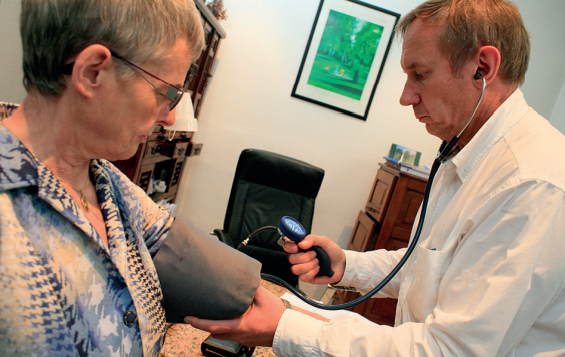
Yet, change it must, said Chauvin. “I really think that the next 5 years will be crucial.
Either we succeed in taking this preventive turn or we shall have to fundamentally change our health system and our social system.”
That would involve opting for a structure more akin to that in the USA, “which is not what the French want”.
Either we succeed in taking this preventive turn or we shall have to fundamentally change our health system and our social system.”
That would involve opting for a structure more akin to that in the USA, “which is not what the French want”.
Names mentioned
New French prime minister Élisabeth Borne
Frédéric Bizard, who heads the Institut Santé,
Franck Chauvin, president of the Haut Conseil de la Santé Publique,
Henri Bergeron, a sociologist specialising in public health at the French National Centre for Scientific Research (CNRS) and research university Sciences Po.
CNRS, Frédéric Pierru
Originally published at https://www.thelancet.com








